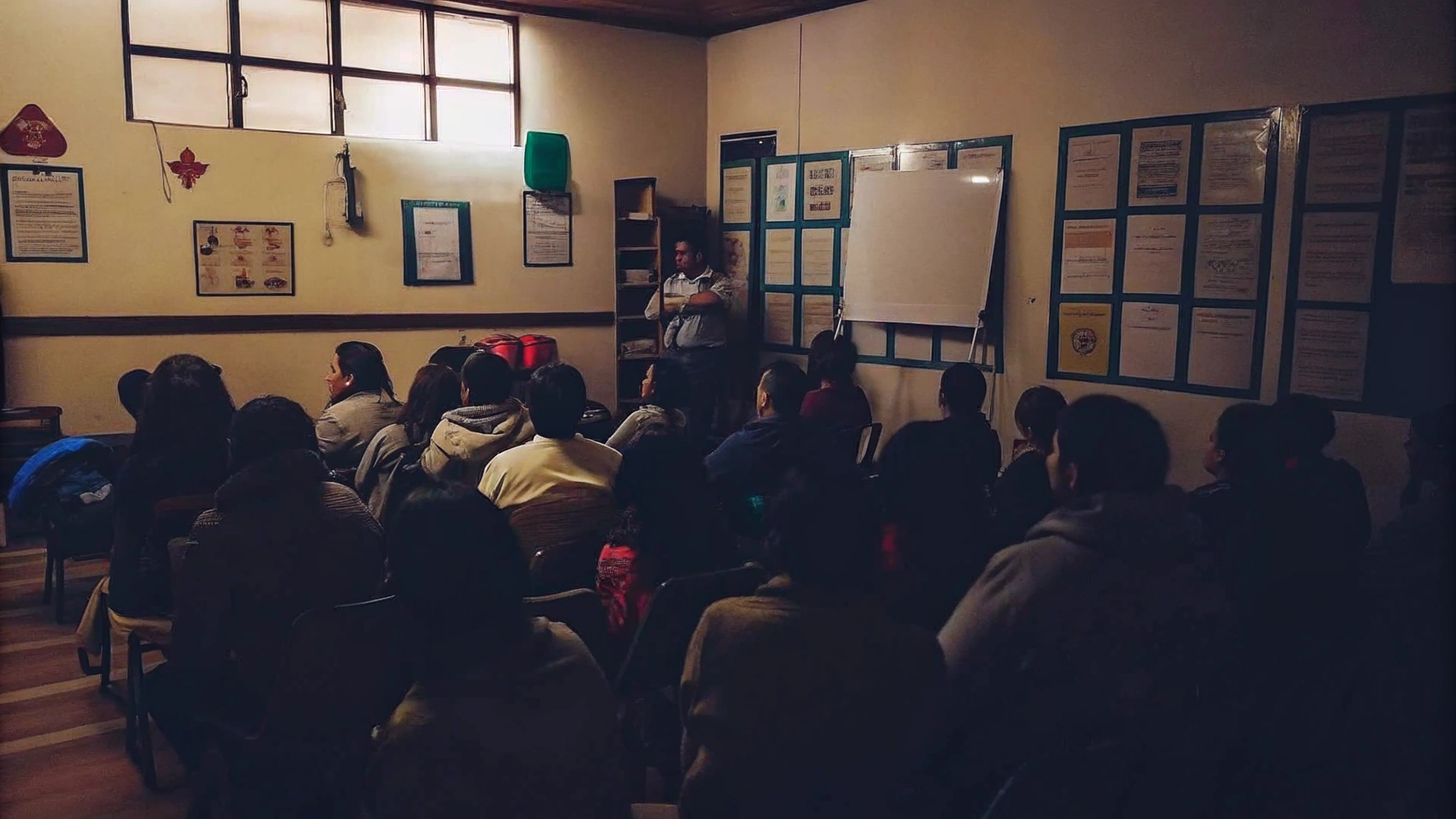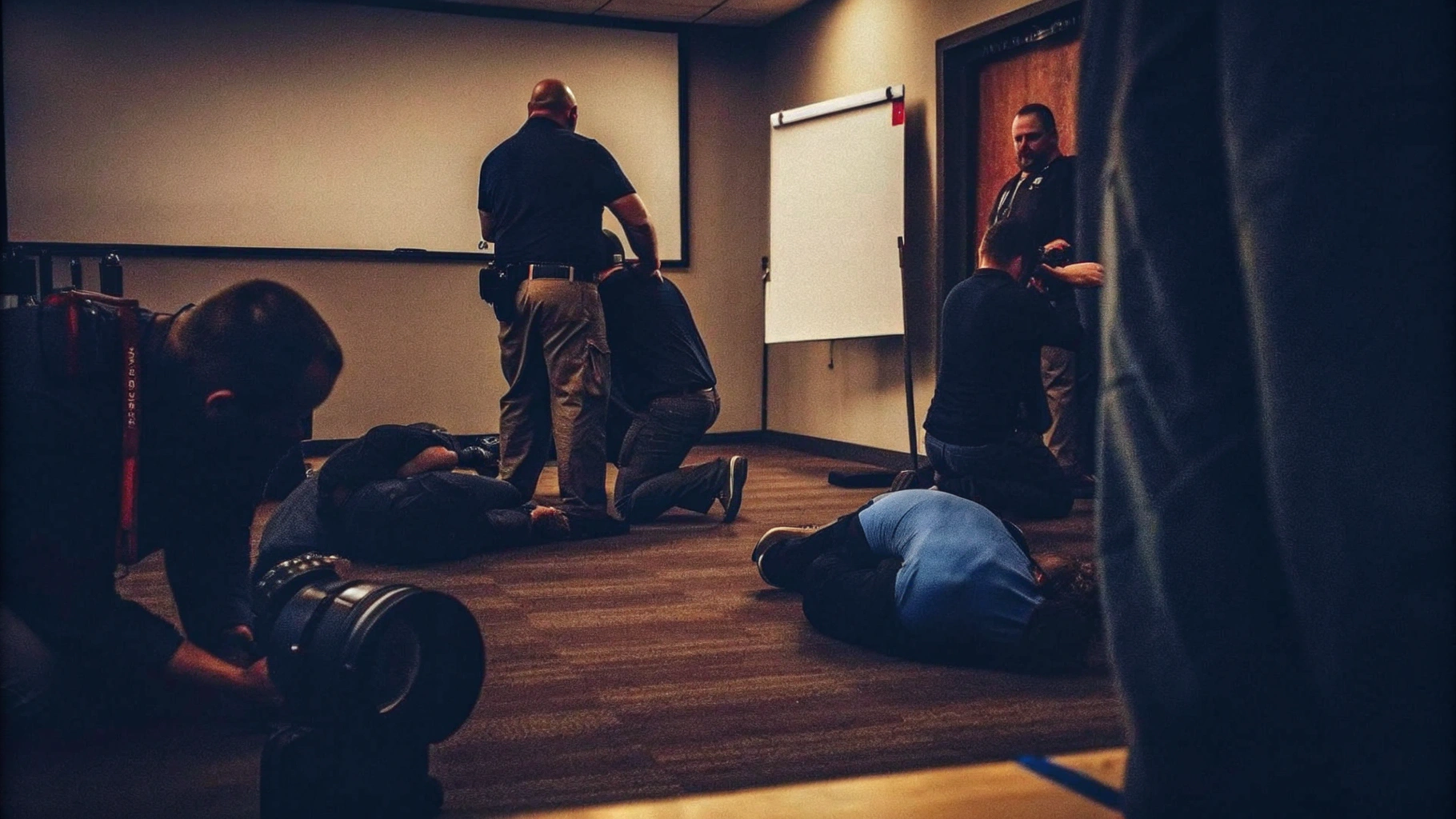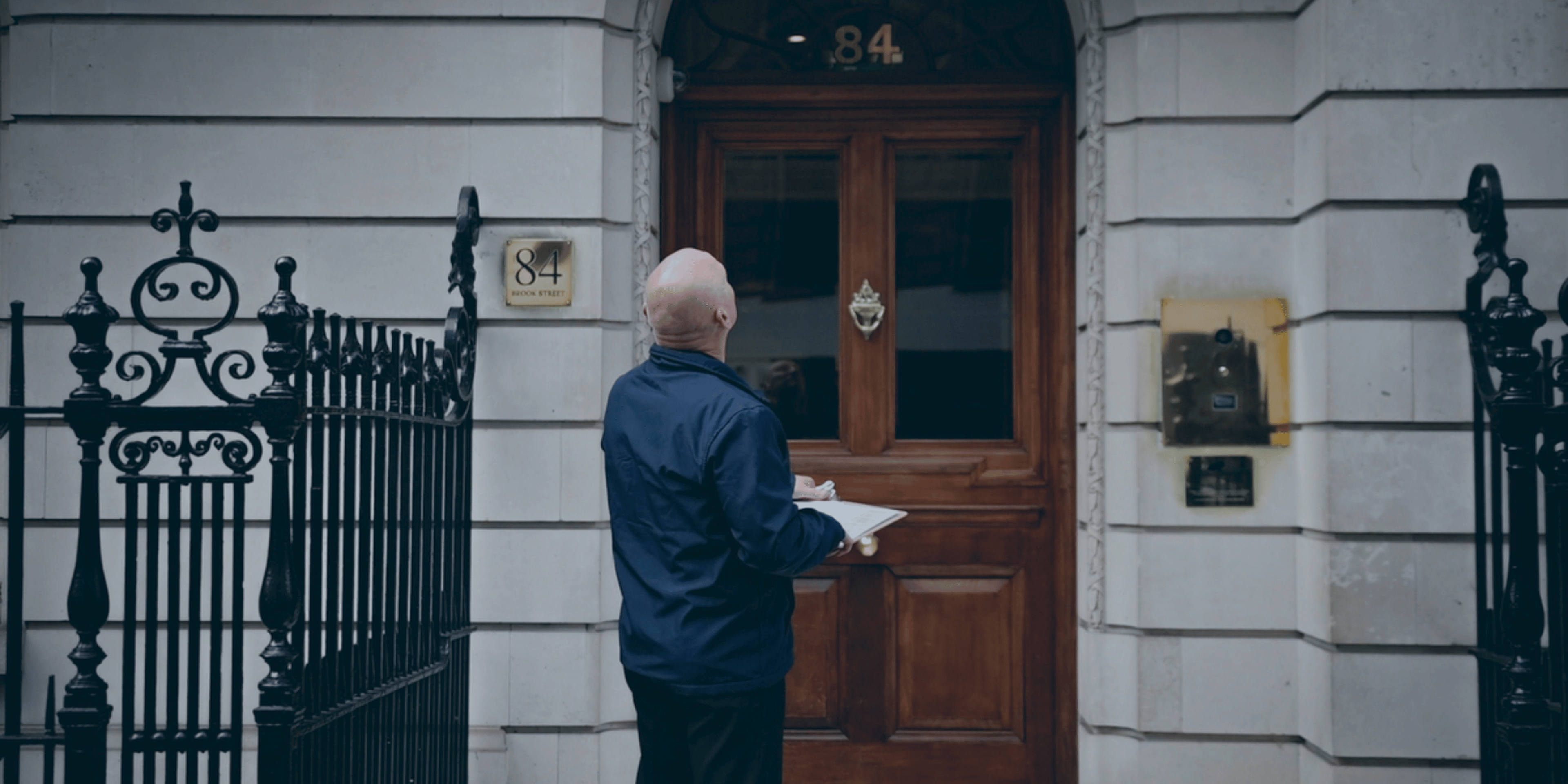
How to Secure Bodyguard Jobs in the UK: A Step-by-Step Guide

Overview
To secure bodyguard jobs in the UK, individuals must develop essential qualities such as:
- Physical fitness
- Situational awareness
- Strong communication skills
These attributes are not merely beneficial; they are critical in a competitive job market where personal protection is increasingly valued. The reality is that without these skills, candidates may struggle to stand out in a crowded field.
Moreover, obtaining relevant training and certifications is paramount. In practise, this not only enhances employability but also signals a commitment to professionalism and excellence. Continuous professional development, alongside effective networking, plays a significant role in ensuring success in this sector.
The lesson is clear: investing in these qualities and skills is not just about securing a job; it’s about building a sustainable career in personal protection. By prioritising these elements, individuals can significantly improve their prospects in a demanding industry.
Introduction
Securing a bodyguard job in the UK reflects a growing emphasis on personal safety, a critical concern for many businesses today. As threats to safety become more pronounced, the demand for qualified bodyguards rises, underscoring the importance of this profession. Aspiring bodyguards must not only acquire the necessary qualifications and skills but also embody key attributes that distinguish them in a competitive job market.
The reality is that navigating the complexities of this field requires more than just training; it demands a strategic approach to personal safety that aligns with broader business resilience. Ignoring the need for well-trained security personnel can lead to significant financial and reputational risks for organisations. Therefore, understanding what makes a successful bodyguard is essential for both individuals seeking employment and businesses looking to protect their interests.
This guide outlines the crucial steps to thrive in this demanding field, from recognising the essential qualities of a successful bodyguard to obtaining the necessary training and certifications. By equipping individuals with this knowledge, we aim to foster a workforce that not only meets the current security challenges but also contributes to the overall safety and resilience of businesses in the UK.
Understand Essential Qualities of a Bodyguard
To secure bodyguard jobs UK, it is crucial to understand the essential attributes of an effective protector. The reality is that these attributes not only enhance individual performance but also contribute significantly to business resilience.
-
Physical Fitness is paramount for bodyguards. A high level of fitness enables them to respond swiftly to threats and manage potentially dangerous situations. Training programmes often include rigorous physical conditioning, endurance workouts, and defensive strategies, ensuring personnel can operate efficiently under stress. As one security expert noted, 'A protector's physical preparedness is not solely about strength; it involves the capacity to withstand long hours and react to crises with agility.' Ongoing training is vital, as it helps security personnel remain fit and ready for the evolving challenges they may face.
-
Situational Awareness is another critical attribute. The ability to assess surroundings and anticipate potential risks can greatly enhance a protector's effectiveness. Identifying questionable actions and understanding the environment are key to safeguarding clients.
-
Strong Communication Skills are essential for coordinating responses and ensuring safety. Bodyguards must articulate concerns clearly while maintaining discretion, as their role often involves sensitive situations. Effective communication with clients, team members, and law enforcement is vital.
-
Discretion and Professionalism are non-negotiable in this field. Bodyguards frequently work with high-profile individuals and must uphold confidentiality and professionalism at all times. Their demeanour should reflect humility and civility, fostering trust with clients. This aligns with Priority First's commitment to professionalism and discretion, ensuring clients feel secure and respected.
-
Problem-Solving Skills are vital for ensuring client safety. The ability to think quickly and make sound decisions under pressure is essential. Bodyguards must be adaptable, ready to shift strategies in unpredictable situations. Moreover, teamwork and cooperation with other personnel are crucial, as effective protection often relies on coordinated efforts, showcasing Priority First's adaptability in diverse environments.
-
Technological Competence is increasingly relevant in today’s security landscape. Personnel must be proficient in using modern security and surveillance systems, enhancing their ability to monitor and respond to threats effectively.
By developing these traits, particularly a commitment to physical fitness and ongoing training, individuals will be better equipped to pursue bodyguard jobs in the UK. This not only represents the principles of client-focused protection but also aligns with the professionalism that Priority First advocates. Investing in these attributes today can prevent greater losses tomorrow.

Obtain Relevant Training and Certifications
To embark on a successful career in security, obtaining the right qualifications and certifications is crucial. The reality is that without these credentials, individuals may struggle to establish themselves in a competitive field. Here’s a structured approach to achieving this:
-
Research Accredited Educational Programmes: Seek out accredited courses that focus on personal protection and security instruction. These programmes typically cover essential topics such as threat assessment, defensive tactics, and emergency response protocols, which are vital for any security professional.
-
Complete a Security Course: Enrol in a comprehensive security course that addresses the legal frameworks surrounding personal protection, including the use of force and self-defence laws applicable in the UK. This knowledge is fundamental for operating within the law and ensuring compliance.
-
Acquire First Aid Certification: First aid training is often a requirement for security personnel. Completing a recognised first aid course, such as First Aid at Work (FAW), First Person on Scene (FPOS), or First Response Emergency Care (FREC), not only enhances your qualifications but also equips you to handle emergencies effectively. Note that a first aid qualification at level 3 or above is necessary before undertaking licence-linked training for close protection operatives.
-
Pursue Specialised Certifications: Depending on your career goals, consider obtaining additional certifications, such as the Close Protection Licence, which is essential for working in protective services in the UK. Remember, applicants must pass an identity and criminality cheque to qualify for an SIA licence, underscoring the importance of integrity in this field.
-
Stay Informed on Industry Standards: Continuously updating your knowledge of the latest protection practises and legal requirements is vital for maintaining a competitive edge. This ongoing education is crucial for adapting to changes in the industry and ensuring that you remain a valuable asset to your employer.
By following these steps, you will lay a solid foundation for your career in personal protection, positioning yourself as a qualified and informed expert in the field. Early investment in your qualifications not only enhances your employability but also contributes to the overall resilience of the businesses you serve.

Network and Apply for Bodyguard Positions
With the necessary training and certifications secured, the next crucial step is to network and apply for bodyguard jobs UK. The reality is that effective networking can significantly enhance your career prospects in this competitive field. Here’s how to navigate this process:
-
Join Industry Associations: Becoming a member of organisations focused on safety and personal protection is essential. These associations offer valuable networking opportunities, access to job boards, and industry resources. Significant organisations in the UK, such as the Security Institute and the British Security Industry Association, provide avenues for career growth and insights. Members of the Security Institute, for instance, have a 30% higher chance of securing job placements compared to non-members.
-
Attend Industry Events: Actively engaging in conferences, workshops, and seminars enables you to connect with experts in the field and stay updated on job opportunities. These events are excellent for building relationships and gaining insights into the latest trends and requirements. As a prominent expert notes, 'Networking is not merely about swapping business cards; it's about creating enduring connexions that can result in opportunities.'
-
Utilise Social Media: Leverage platforms like LinkedIn to connect with professionals and organisations in the field. Sharing your qualifications and expressing your interest in security roles can help you stand out. Engaging with content related to security can also enhance your visibility within the industry.
-
Regularly cheque job boards and company websites for bodyguard jobs UK. Tailor your resume and cover letter to emphasise your relevant skills and experiences, ensuring they align with the specific requirements of each position.
-
Prepare for Interviews: When you secure an interview, be ready to discuss your training, experiences, and how you can contribute to the safety of clients. Practising common interview questions related to security and personal protection will help you present yourself confidently.
In practise, by actively networking and applying for roles, you significantly enhance your chances of obtaining a security position, positioning yourself as a proactive candidate in a competitive field.

Pursue Continuous Professional Development
To maintain a competitive advantage in the security profession, continuous professional development is essential. The reality is that the landscape of personal protection is constantly evolving, and professionals must adapt to stay relevant. Here are several strategies to enhance your skills and career prospects:
-
Attend Advanced Training Courses: Enrolling in specialised courses covering critical areas such as executive protection, threat assessment, and crisis management is vital. These programmes equip you with the latest techniques and knowledge necessary for effective personal protection. Advanced training is invaluable in adapting to the evolving landscape of personal protection, and it can be complemented by understanding how to implement protective measures like access control systems offered by Priority First.
-
Stay Updated on Industry Trends: Regularly consulting industry publications, blogs, and forums is crucial to remain informed about emerging techniques, technologies, and legal developments impacting personal protection. For instance, the personal protection sector increasingly incorporates AI-driven tools and advanced surveillance systems to improve safety measures. Keeping abreast of these trends allows you to leverage the latest technologies in your practise.
-
Seek Mentorship: Building relationships with experienced bodyguards or security experts can provide valuable insights and guidance. Mentorship offers practical advice and helps navigate the complexities of your career path. Learning from seasoned professionals can also highlight how tailored risk assessments enhance your effectiveness in the field.
-
Participate in Simulations and Drills: Engaging in realistic practise exercises that mimic real-life scenarios is crucial for honing your skills. These simulations prepare you for various situations you may encounter in the field. Structured training programmes, such as those provided by Priority First, enhance your readiness and effectiveness in high-pressure environments.
-
Evaluate Your Progress: Regularly assessing your skills and knowledge helps pinpoint areas for improvement. Establishing new career objectives based on this assessment keeps you focused and motivated. Ongoing evaluation is a key element of career development, ensuring that you remain competitive in the field.
The lesson is clear: by committing to ongoing career development, you will not only improve your skills but also significantly increase your employability and efficiency for bodyguard jobs UK. As industry experts emphasise, advanced training is invaluable in adapting to the evolving landscape of personal protection, ensuring you remain a sought-after professional in this competitive field.

Conclusion
In the UK, the demand for security professionals is rising, underscoring the critical role bodyguards play in safeguarding individuals and assets. This reality highlights the necessity for aspiring bodyguards to not only acquire essential skills and certifications but also to engage in continuous professional development. Ignoring this need can lead to significant financial and reputational risks for businesses that fail to prioritise security.
The implications are clear:
- Physical fitness
- Situational awareness
- Strong communication skills
These are not just desirable traits; they are essential for effective performance in this field. Furthermore, obtaining relevant training, such as first aid certifications and specialised qualifications, is crucial for establishing a successful career. Networking through industry associations and leveraging social media can significantly enhance job prospects, ensuring that bodyguards remain competitive in a dynamic environment.
Ultimately, the journey to becoming a successful bodyguard is multifaceted and requires dedication. By investing in personal development and adapting to industry changes, individuals not only enhance their employability but also contribute to a safer environment for clients. Embracing these principles will pave the way for a rewarding career in personal protection, reinforcing the vital role that bodyguards play in today’s society.
Frequently Asked Questions
What are the essential qualities of an effective bodyguard?
Essential qualities of an effective bodyguard include physical fitness, situational awareness, strong communication skills, discretion and professionalism, problem-solving skills, and technological competence.
Why is physical fitness important for bodyguards?
Physical fitness is crucial for bodyguards as it enables them to respond swiftly to threats and manage dangerous situations. It involves the capacity to withstand long hours and react with agility during crises.
How does situational awareness contribute to a bodyguard's effectiveness?
Situational awareness allows bodyguards to assess their surroundings and anticipate potential risks, which enhances their ability to identify questionable actions and understand the environment to safeguard clients.
What role do communication skills play in bodyguard work?
Strong communication skills are essential for coordinating responses and ensuring safety. Bodyguards must articulate concerns clearly while maintaining discretion, facilitating effective communication with clients, team members, and law enforcement.
Why is discretion and professionalism important for bodyguards?
Discretion and professionalism are non-negotiable because bodyguards often work with high-profile individuals. They must uphold confidentiality and professionalism to foster trust and ensure clients feel secure and respected.
What problem-solving skills are necessary for bodyguards?
Bodyguards need to think quickly and make sound decisions under pressure. Adaptability is essential, as they must shift strategies in unpredictable situations and work effectively with other personnel.
How does technological competence factor into modern bodyguard roles?
Technological competence is increasingly relevant as bodyguards must be proficient in using modern security and surveillance systems, which enhances their ability to monitor and respond to threats effectively.
How can individuals prepare for bodyguard jobs in the UK?
Individuals can prepare for bodyguard jobs in the UK by developing essential traits such as physical fitness, situational awareness, communication skills, and problem-solving abilities, along with ongoing training to stay equipped for challenges.




